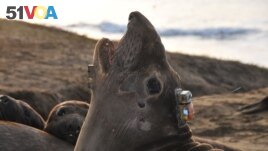22 May 2021
A new study has found that elephant seals have to work very hard to stay fat.
The research represents the most complete study to date of the feeding behavior of northern elephant seals. Scientists paid special attention to females of the species during difficult two-month trips, or migrations, in the northeastern Pacific Ocean.
The seals were found to spend up to 20 hours every day - and sometimes a full 24 hours - in continuous deep-diving to feed on fish. They fed 1,000 to 2,000 times daily to gain the body fat necessary for reproduction and warmth in the cold waters.

A bio-logging electronic tag to track its deep-ocean foraging behavior is seen attached to the head of a female northern elephant seal at Ano Nuevo State Park in California, U.S. in an undated photograph. (Daniel Costa/Handout via REUTERS)
Taiki Adachi of the University of St Andrews in Scotland led the study, which recently appeared in the journal Science Advances.
"It is not easy to get fat," Adachi said.
Researchers studied 48 female elephant seals from Año Nuevo State Park in California as they traveled large ocean distances. Their entire trip was around 6,000 kilometers.
Scientists based their findings on data collected in 2011 and 2018. They used three small removable devices.
One device, attached under the jaw, counted the number of times the seals fed and measured their depth. A second satellite-linked device, attached to the head, followed the seals' ocean movements. The third device was a "smart" video camera with an infra-red LED light and another depth sensor. It was also attached to the head.
Elephant seals get their name from the large noses of the males. These noses look like an elephant's trunk. There are two species - the northern elephant seal and the slightly larger southern elephant seal. The two are the world's biggest seals and the largest ocean mammals other than whales.
Male northern elephant seals can grow up to 4 meters long and weigh up to 2,000 kilograms. Females are smaller, getting up to about 3 meters in length and 590 kilograms. The males feed only in coastal waters.
Some large marine mammals depend on deep dives to get enough food to support their large bodies. Sperm whales, for example, hunt for large prey like giant squid.
Female elephant seals -- which are large, but not as big as sperm whales -- have a different solution. They eat huge amounts of small fish. But it is difficult for them to catch enough small fish to meet the energy needs of their large bodies.
Adachi said about the female elephant seals:
"They continuously dive, for long periods of time - 20 minutes on average and about 100 minutes at maximum - and deep - 500 meters on average and about 1,500 meters at maximum - with only a few minutes breathing at the surface."
Adachi noted that the seals do not come back to land for their two-month trip, or migration. "The sleeping hours in at-sea animals is not fully understood. But, based on our record of extreme foraging, their available time for sleeping should be less than 20 percent of the day," he added.
Foraging is a term that means looking for food.
Northern elephant seals live on the Pacific coast of the United States, Canada and Mexico. They generally give birth in California and Baja California, usually on offshore islands, from December to March. During their mating season, they do not eat. During this period they lose about a third of their body weight.
I'm John Russell.
Will Dunham reported on this story for Reuters. John Russell adapted it for Learning English. Bryan Lynn was the editor.
_____
Words in This Story
species – n. biology : a group of animals or plants that are similar and can produce young animals or plants : a group of related animals or plants that is smaller than a genus
jaw – n. either one of the two bones of the face where teeth grow
prey – n. an animal that is hunted or killed by another animal for food










